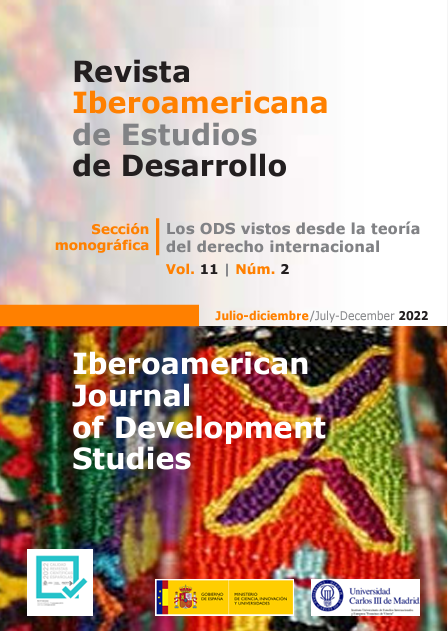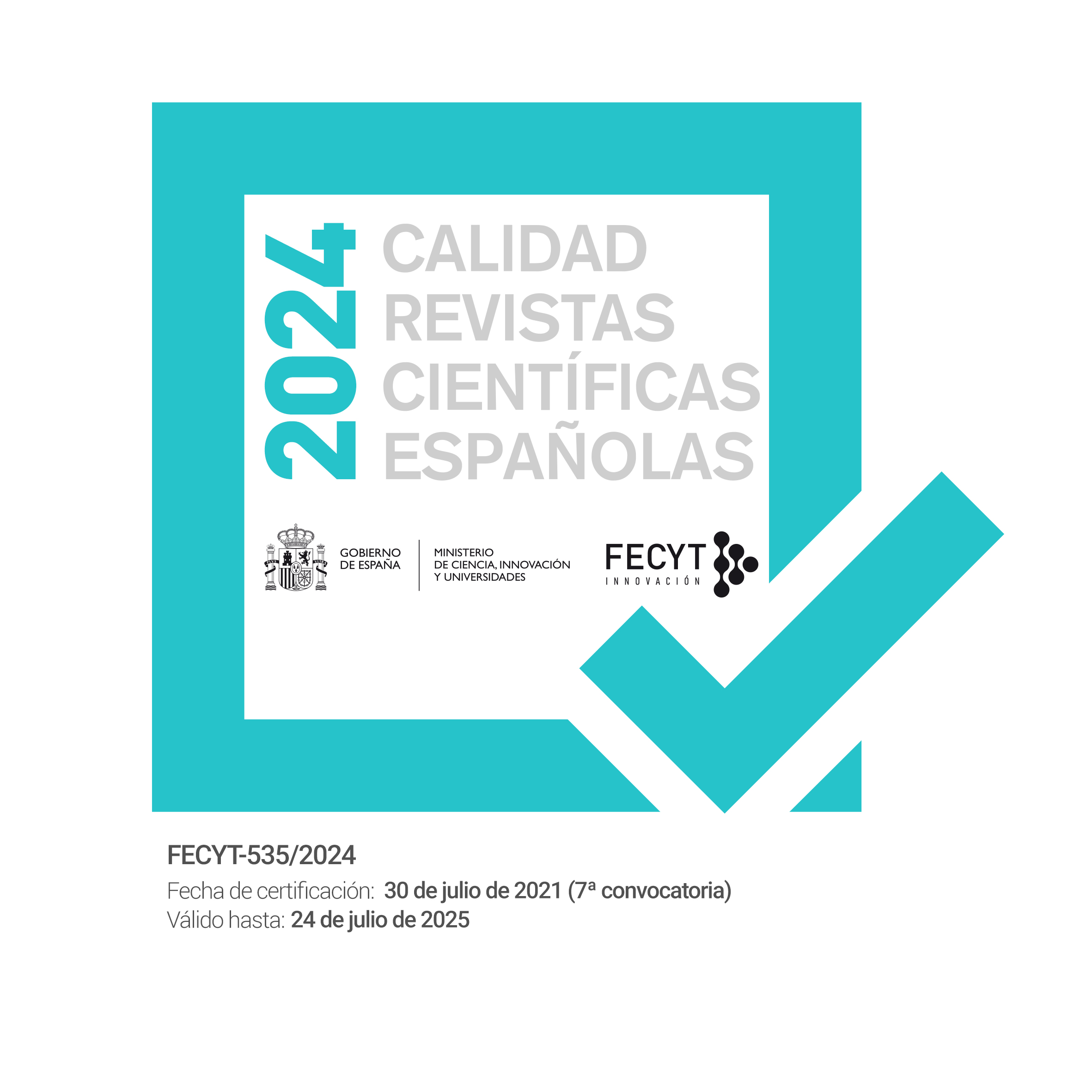Rural European population facing the challenges of global citizenship education
DOI:
https://doi.org/10.26754/ojs_ried/ijds.672Keywords:
attitudes, education for development, European rural areas, global citizenship education, public opinionAbstract
Supporting the creation of a critical citizen, with deeply rooted community values of solidarity and active compromise to the spread and development of those values, is making means believing in a better world in which no one can nor should feel excluded. Nevertheless, this is met with differing opinions. This study approaches attitudes towards Global Citizenship Education specifically though the framework of the population of rural Europeans who participated in the Rural DEAR Agenda ‒ EYD 2015 Project. In order to do, quantitative research was carried out based on a survey and questionnaire developed. The questionnaire focused on interest in international solidarity; for example, opinions and attitudes towards injustices suffered by impoverished countries, as well as opinions surrounding the possibility of changing this situation. The results obtained reveal a shocking reality in many ways relative to international solidarity and a low level of compromise regarding taking action to change the current situation.
Downloads
References
ABBAR S, ZANOUDA T, BERTI-EQUILLE L, BORGE-HOLTHOEFER J (2016). Using Twitter to Understand Public Interest in Climate Change: The Case of Qatar. The Workshops of the Tenth International AAAI Conference on Web and Social Media Social Web for Environmental and Ecological Monitoring: Technical Report, pp. 16-20.
ABEL G, BARAKAT B, SAMIR K, LUTZ W (2016). Meeting the Sustainable Development Goals leads to lower world population growth. Proceedings of the National Academy of Sciences 113(50):14294-14299.
ANDREOTTI V (2006). Soft versus critical global citizenship education. Development Education, Policy and Practice 3:83-98.
ANDREOTTI V (2011). (Towards) Decoloniality and Diversality in Global Citizenship Education. Globalisation, Societies and Education 9(3-4):381-397.
ANDREOTTI V (2013). Conhecimento, Escolarização, Currículo E a Vontade De «Endireitar» a Sociedade Através da Educação. Revista Teias 14(33):215-227.
ANDREOTTI V (2016). The Educational Challenges of Imagining the World Differently. Canadian Journal of Development Studies 37(1):101-112.
AROCENA R, GÖRANSSON B, SUTZ J (2015). Knowledge policies and universities in developing countries: Inclusive development and the «developmental university». Technology in Society 41:10-20.
BANKS J (2008). Teaching for Social Justice, Diversity, and Citizenship in a Global World. Educational Forum 68(4):296-305.
BIRDSALL N, RODRIK D, SUBRAMANIAN A (2005). How to Help Poor Countries. Foreign Affairs 84(4):136-152.
BOSTRÖM L, DALIN R (2018). Young people’s opinion on rural Sweden. International Education Studies 11(6):45-58.
BOURN D (2011). Discourses and Practices around Development Education: From Learning about Development to Critical Global Pedagogy. Policy & Practice: A Development Education Review 13:11-29.
BRYAN A, BRACKEN M (2011). Learning to Read the World?: Teaching and Learning about Global Citizenship and International Development in Post-primary Schools. University College Dublin, Dublin.
CARDONA C (2002). Introducción a los Métodos de Investigación en Educación. EOS, Madrid.
CASTILLO A (2009). Actitudes cívicas y dimensiones de la ciudadanía democrática en Europa. Revista Española de Investigaciones Sociológicas 125(1):47-80.
CEA M (2001). Metodología cuantitativa: estrategias y técnicas de investigación social. Síntesis, Madrid.
CELORIO J, CELORIO G (2011). ¿Educación? para el ¿desarrollo? Pueblos. Revista de información y Debate 46:1-3.
CLARK A, SIKKINK K (2013). Information Effects and Human Rights Data: Is the Good News about Increased Human Rights Information Bad News for Human Rights Measures? Human Rights Quarterly 35(3):539-568.
DALTON R (2008). Citizenship norms and the expansion of political participation. Political studies 56(1):76-98.
DAVIES L (2006). Global citizenship: abstraction or framework for action? Educational review 58(1):5-25.
DAVIES I, EVANS M, REID A (2005). Globalising citizenship education? A critique of «global education» and «citizenship education». British Journal of Educational Studies 53(1):66-89.
DE PAZ D (2007). Escuelas y educación para la ciudadanía global: una mirada transformadora. Intermón Oxfam, Barcelona.
DÍAZ Á (2005). Education in values: Avatars of the formal, hidden and cross-cutting curricula. Revista Electrónica de Investigación Educativa 8(1):1-15.
DÍEZ E (2012). Educating in and for degrowth. Cuadernos de pedagogía (421):86-89.
FARISS C (2014). Respect for human rights has improved over time: modeling the changing standard of accountability. American Political Science Review 108(2):297-318.
FREIRE P (1997). A la sombra de este árbol. El Roure, Barcelona.
GÓMEZ J (coord.) (2017). Diagnóstico de la educación para el desarrollo y la ciudadanía global. Universidad de Zaragoza, Zaragoza.
HILL D, MOORE W, BUMBA M (2013). Information Politics v Organizational Incentives: When are Amnesty International’s «Naming and Shaming» Reports Biased? International Studies Quarterly 57(2):219-232.
HIROWATARI S (2019). Rural/public health opinion: living rurally. Australian Medicine 31(3):16.
HOLDEN C, HICKS D (2007). Making global connections: the knowledge, understanding and motivation of trainee teachers. Teaching and Teacher Education 23(1):13-23.
HUNG R (2012). Being human or being a citizen? Rethinking human rights and citizenship education in the light of Agamben and Merleau-Ponty. Cambridge Journal of Education 42(1):37-51.
ISIN E, TURNER B (2007). Investigating Citizenship: An Agenda for Citizenship Studies. Citizenship Studies 11(1):5-17.
KAPOOR I (2014). Psychoanalysis and Development: Contributions, Examples, Limits. Third World Quarterly 35(7):1120-1143.
KERR D (1999). Changing the political culture: the advisory group on education for citizenship and the teaching of democracy in schools. Oxford Review of Education 25(1-2):275-284.
KIWAN, D. (2012). Human rights and citizenship education: re-positioning the debate. Cambridge Journal of Education 42(1):1-7.
KLÍMOVÁ-ALEXANDER I (2017). The Romani voice in world politics: the United Nations and non-state actors. Routledge, New York.
KOIRALA B, ARAGHI Y, KROESEN M, GHORBANI A, HAKVOORT R, HERDER P (2018). Trust, awareness, and independence: insights from a socio-psychological factor analysis of citizen knowledge and participation in community energy systems. Energy Research & Social Science 38:33-40.
KÖNÖNEN J (2018). Differential inclusion of non-citizens in a universalistic welfare state. Citizenship Studies 22(1):53-69.
LOADER B, VROMEN A, XENOS M (2014). The networked young citizen: social media, political participation and civic engagement. Information, Communication & Society 17(2):143-150.
MCKERNAN J (2001). Investigación-acción y currículum. Morata, Madrid.
MIGUEL LJ (coord.) (2012). Educación para el desarrollo en Castilla y León: cómo vemos el mundo. Universidad de Valladolid, Valladolid.
MOMIROVIC D, JANKOVIC M, RANDELOVIC M (2016). Invensment, world economy and poor countries. Ekonomika 62(1):83-96.
MONK D (2014). Introducing Corporate Power to the Global Education Discourse. Policy & Practice: A Development Education Review 19:33-51.
MURRAY S (2006). Editorial. Policy & Practice: A Development Education Review 3:1-4.
OBSERVATORIO DE COOPERACIÓN INTERNACIONAL PARA EL DESARROLLO DE LA UNIVERSIDAD DE VALLADOLID (OCUVa) (2016). Resumen ejecutivo del diagnóstico de la Educación para el Desarrollo en el ámbito rural europeo: resumen ejecutivo. OCUVa, Valladolid.
OSLER A, STARKEY H (2018). Extending the theory and practice of education for cosmopolitan citizenship. Educational Review 70(1):31-40.
OTAKE K, SHIMAI S, TANAKA-MATSUMI J, OTSUI K, FREDRICKSON B (2006). Happy people become happier through kindness: a counting kindnesses intervention. Journal of happiness studies 7(3):361-375.
PASHBY K (2015). Conflations, possibilities, and foreclosures: Global citizenship education in a multicultural context. Curriculum Inquiry 45(4):345-366.
PASHBY K, COSTA M, STEIN S, ANDREOTTI V (2020). A meta-review of typologies of global citizenship education. Comparative Education 56(2):144-164.
PÉREZ L, CARRACEDO M (2016). Estado de la cuestión de la educación para el desarrollo en las zonas europeas del Proyecto Rural DEAR Agenda. En: Resumen del diagnóstico de la Educación para el Desarrollo en el ámbito rural europeo. OCUVa, Valladolid, pp. 25-52.
PETERSON A, WARWICK P (2015). Global learning and education. Key concepts and effective practice. Routledge, New York.
REYSEN S, KATZARSKA-MILLER I (2013). A Model of Global Citizenship: Antecedents and Outcomes. International Journal of Psychology 48(5):858-870.
RIBEIRO A, CAETANO A, MENEZES I (2016). Citizenship education, educational policies and NGOs. British Educational Research Journal 42(4):646-664.
SALTER P, HALBERT K (2017). Constructing the [Parochial] Global Citizen. Globalisation, Societies and Education 15(5):694-705.
SANTAMARÍA-CÁRDABA N, MARTÍNEZ-SCOTT S, VICENTE-MARIÑO M (2021). Discovering the way: past, present and possible future lines of global citizenship education. Globalisation, Societies and Education 1-9.
SCHEEPERS P, GROTENHUIS M (2005). Who Cares for the Poor in Europe? Micro and Macro Determinants for Alleviating Poverty in 15 European Countries. European Sociological Review 21(5):453-465.
SCHEUNPFLUG A (2021). Global learning: educational research in an emerging field. European Educational Research Journal 20:3-13.
SELBY D, KAGAWA F (2011). Development Education and Education for Sustainable Development: Are They Striking a Faustian Bargain? Policy & Practice: A Development Education Review 12:15-31.
SMITH W, FRASER P, CHYKINA V, IKOMA S, LEVITAN J, LIU J, MAHFOUZ J (2016). Global Citizenship and the Importance of Education in a Globally Integrated World. Globalisation, Societies and Education 15(5):648-665.
SOLÍS-GADEA H (2010). Education for Global Citizenship: The Role of Universities in the Maintenance of Civilization in the Context of Late Modernity and Globalization Some Comments on the Mexican Case. Procedia ‒ Social and Behavioral Sciences 2 (2):3180-3184.
STARKEY H (2012). Human Rights, Cosmopolitanism and Utopias: Implications for Citizenship Education. Cambridge Journal of Education 42(1):21-35.
TAGKALOGLOU S, KASSER T (2018). Increasing collaborative, pro-environmental activism: The roles of Motivational Interviewing, self-determined motivation, and self-efficacy. Journal of Environmental Psychology 58:86-92.
TAKKAC M, AKDEMIR A (2012). Training future members of the world with an understanding of global citizenship. Procedia-Social and Behavioral Sciences 47:881-885.
THAKUR R (2016). The United Nations, peace and security: from collective security to the responsibility to protect. Cambridge University Press, New York.
UNESCO (2015). Global Citizenship Education: Topics and Learning Objectives. UNESCO, Paris.
VARADHARAJAN M, BUCHANAN J (2017). Any small change? Teacher education, compassion, understandings and perspectives on global development education. International Journal of Development Education and Global Learning 9(1):33-48.
WOOD B, BLACK R (2014). Performing Citizenship Down Under: Educating the Active Citizen. Journal of Social Science Education 13(4):56-65.
Downloads
Published
How to Cite
Issue
Section
License
Copyright (c) 2022 José María Marbán, Noelia Santamaría-Cárdaba, Luis Torrego-Egido

This work is licensed under a Creative Commons Attribution-NonCommercial-NoDerivatives 4.0 International License.








